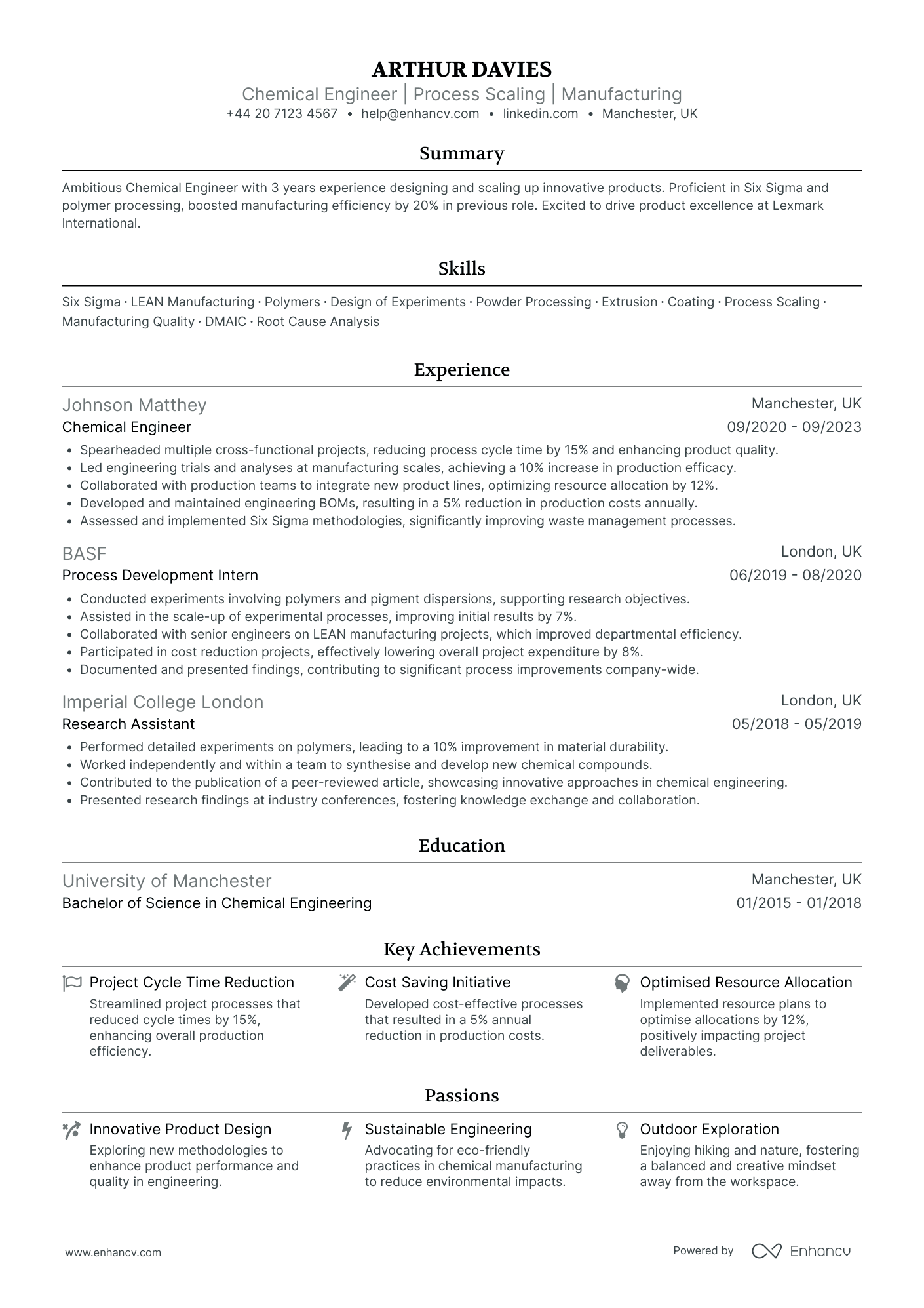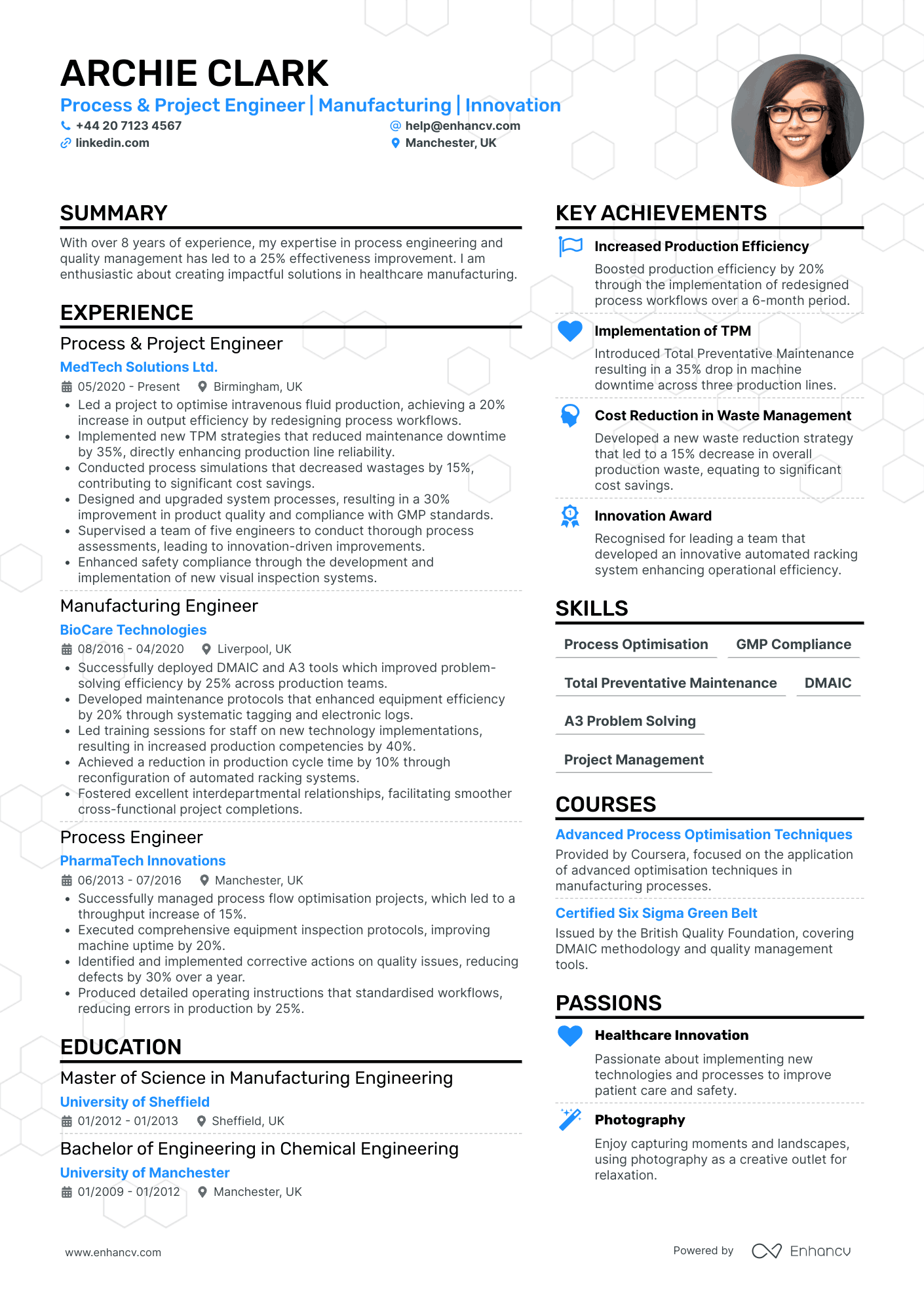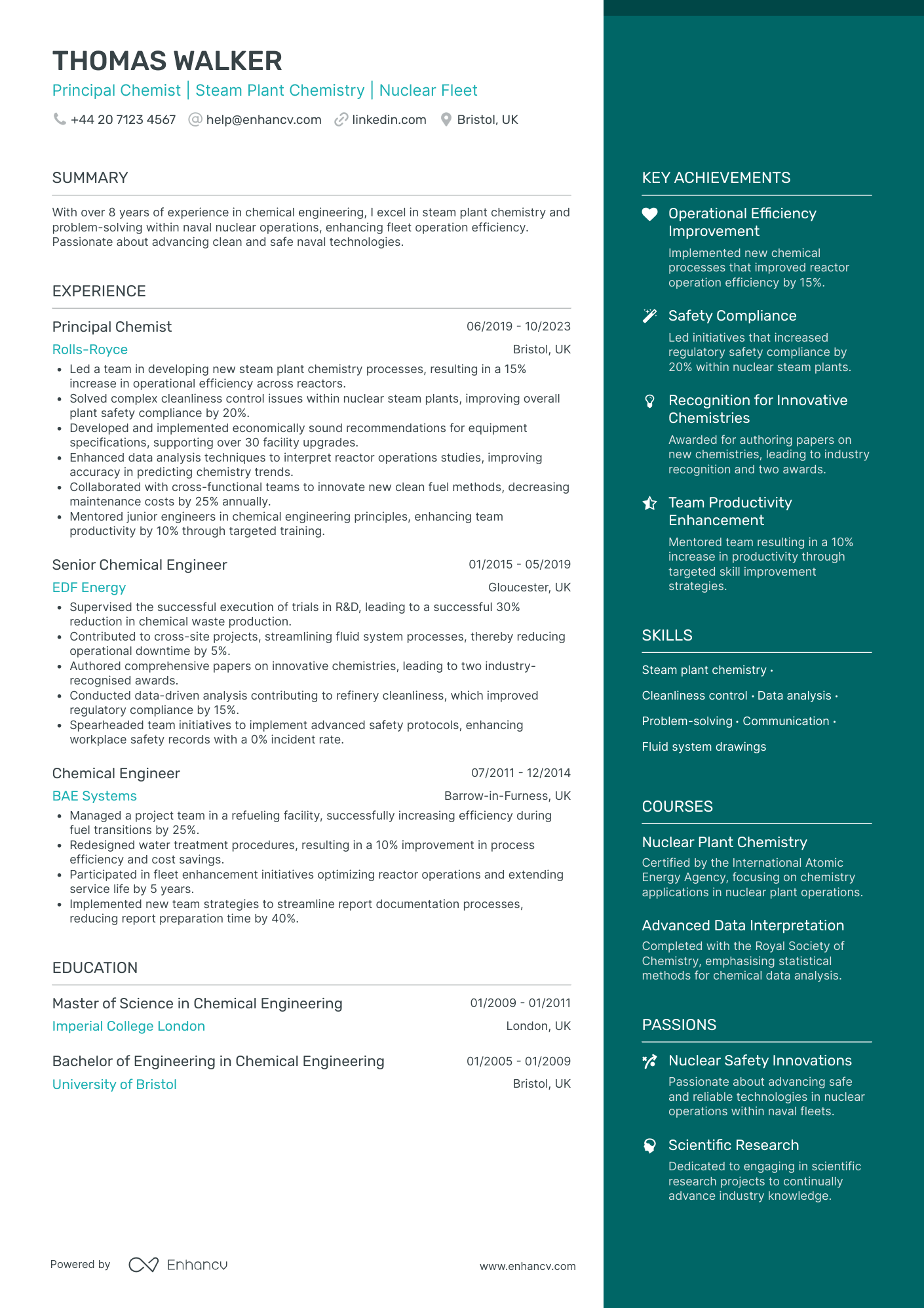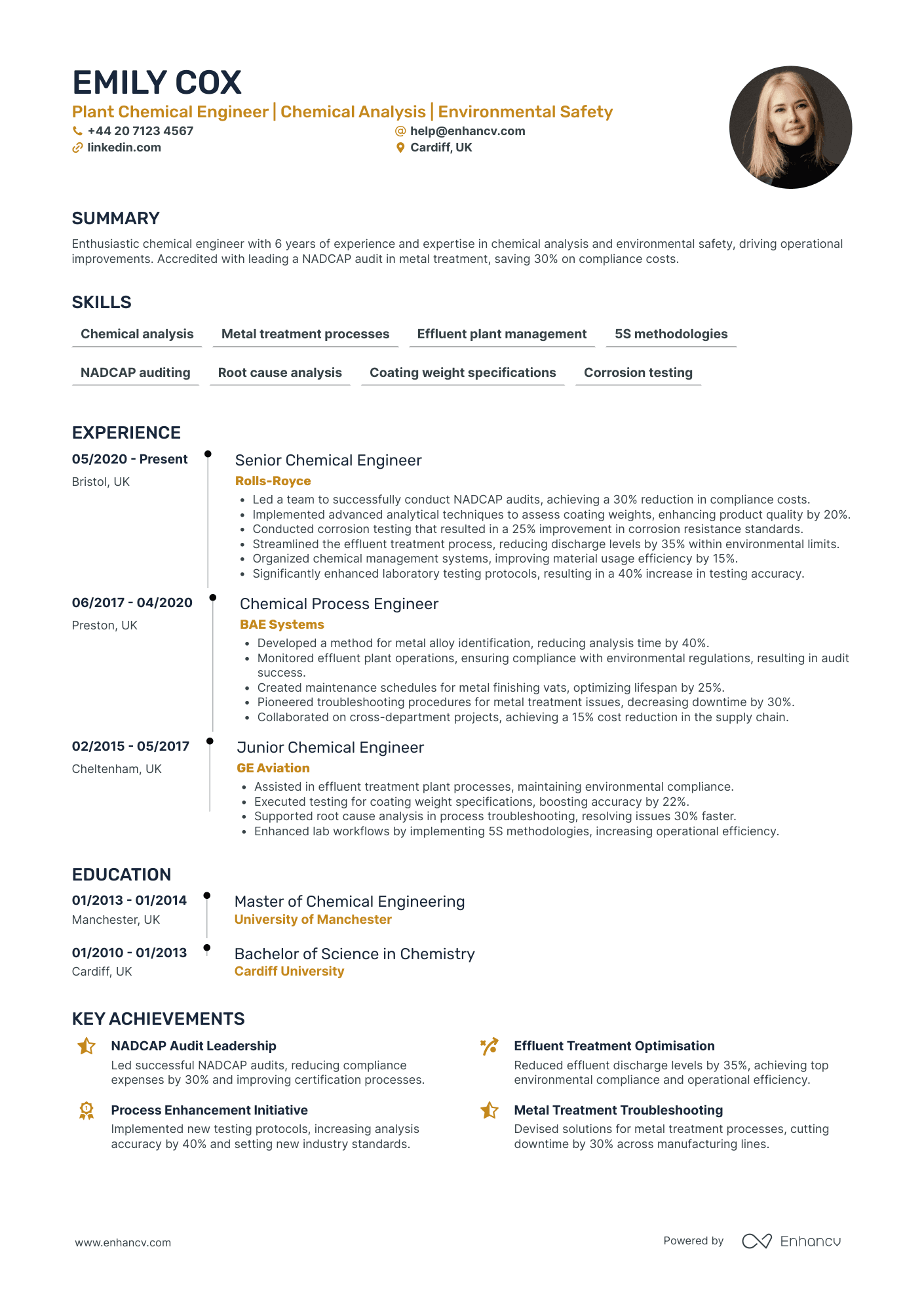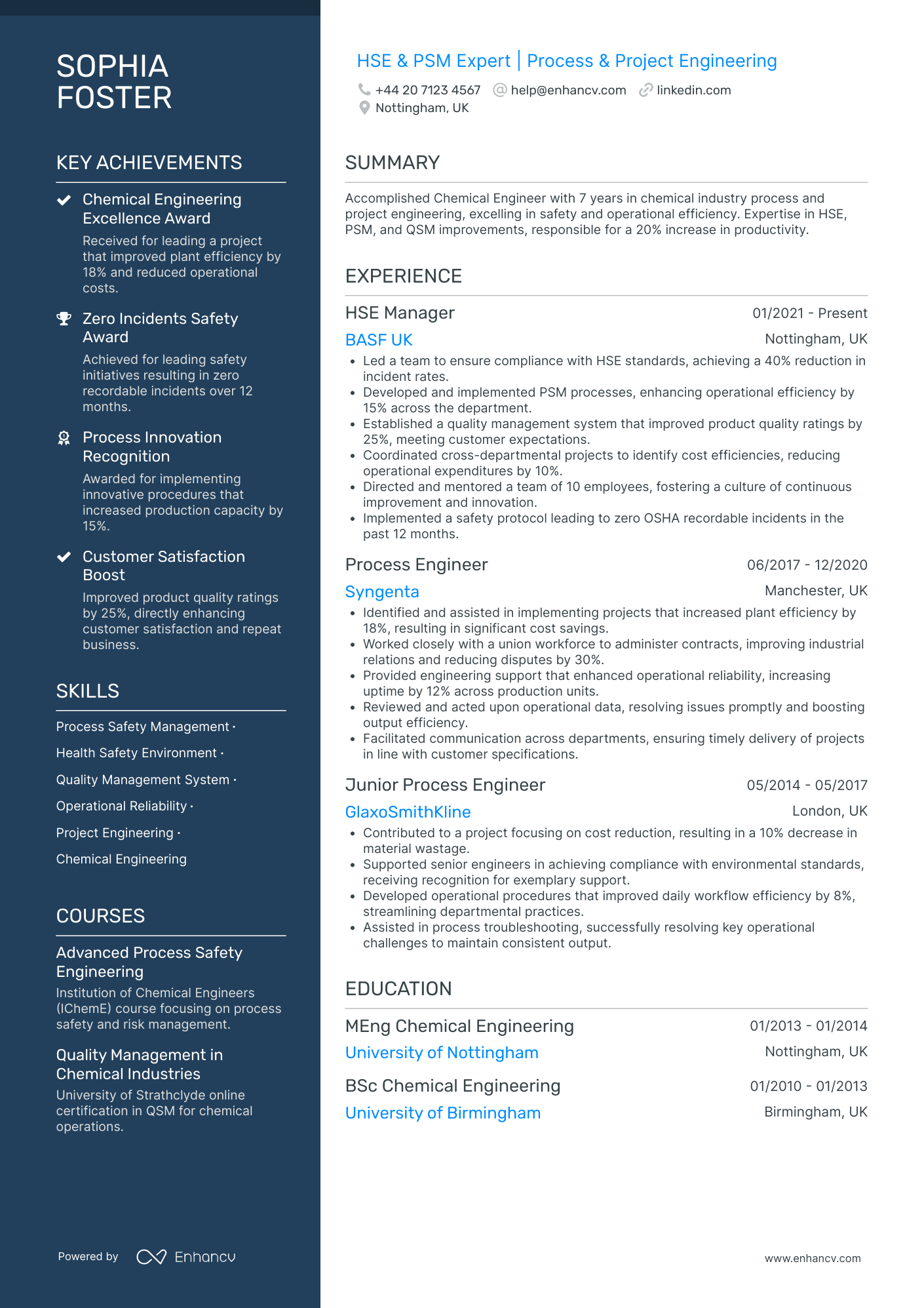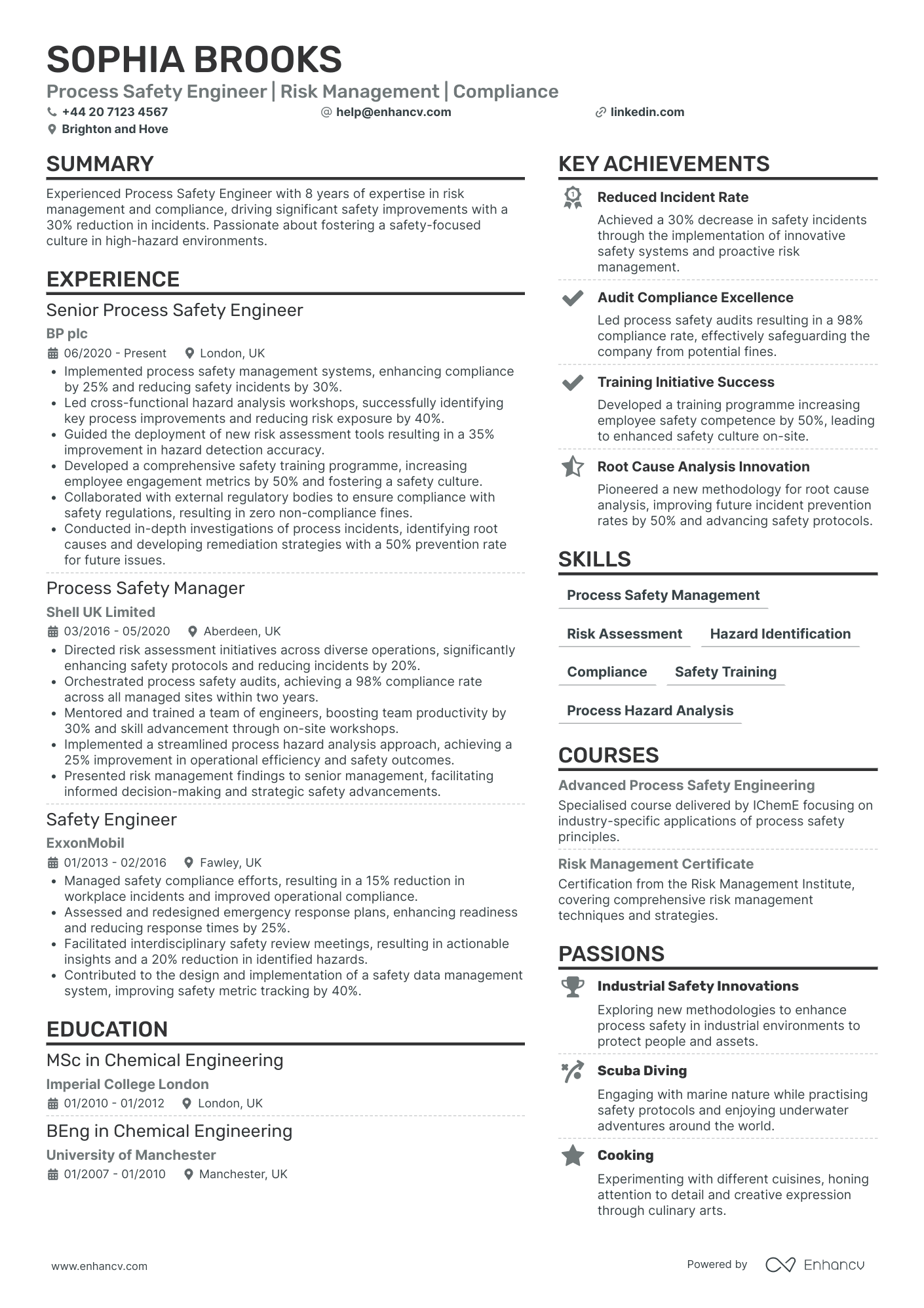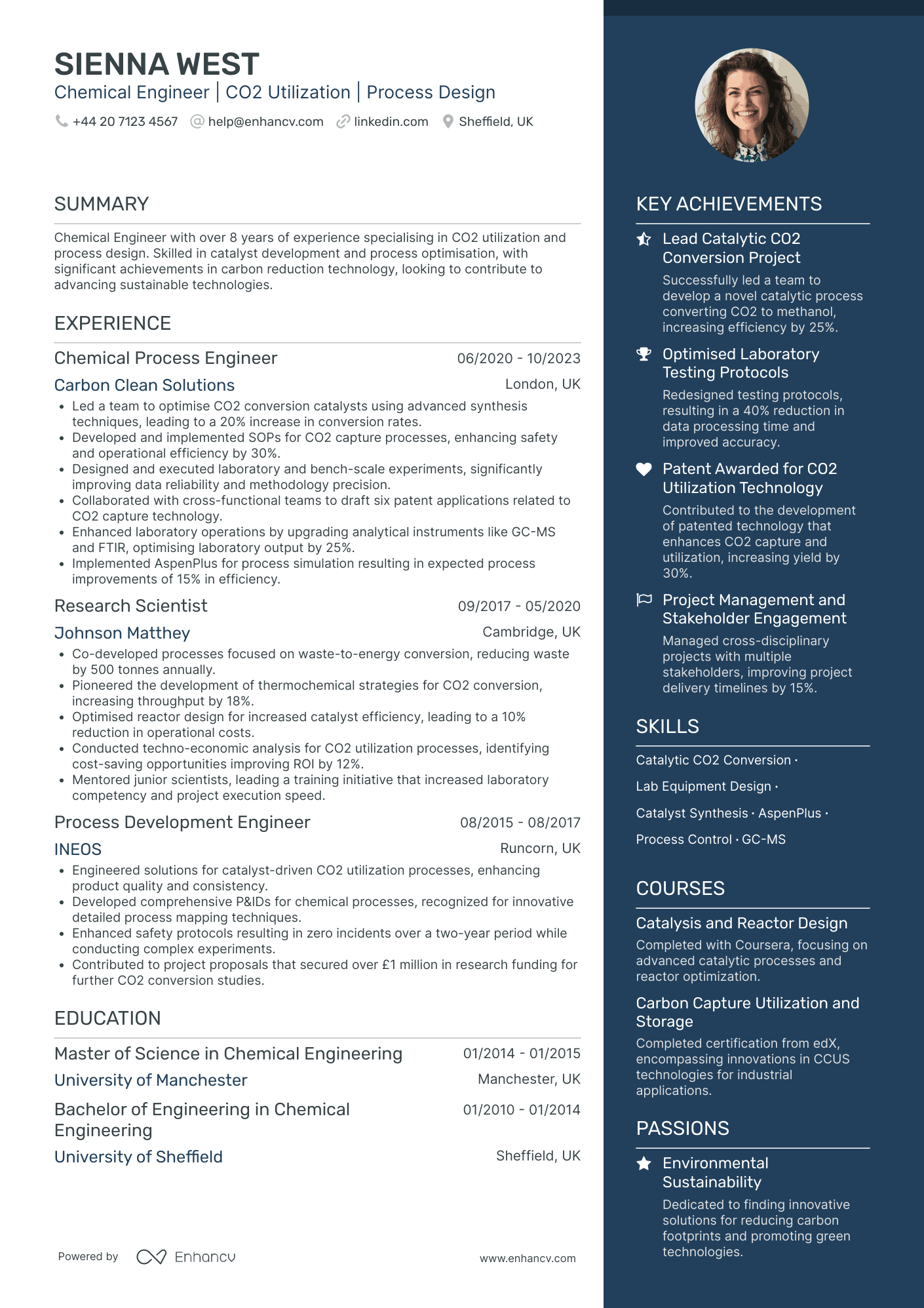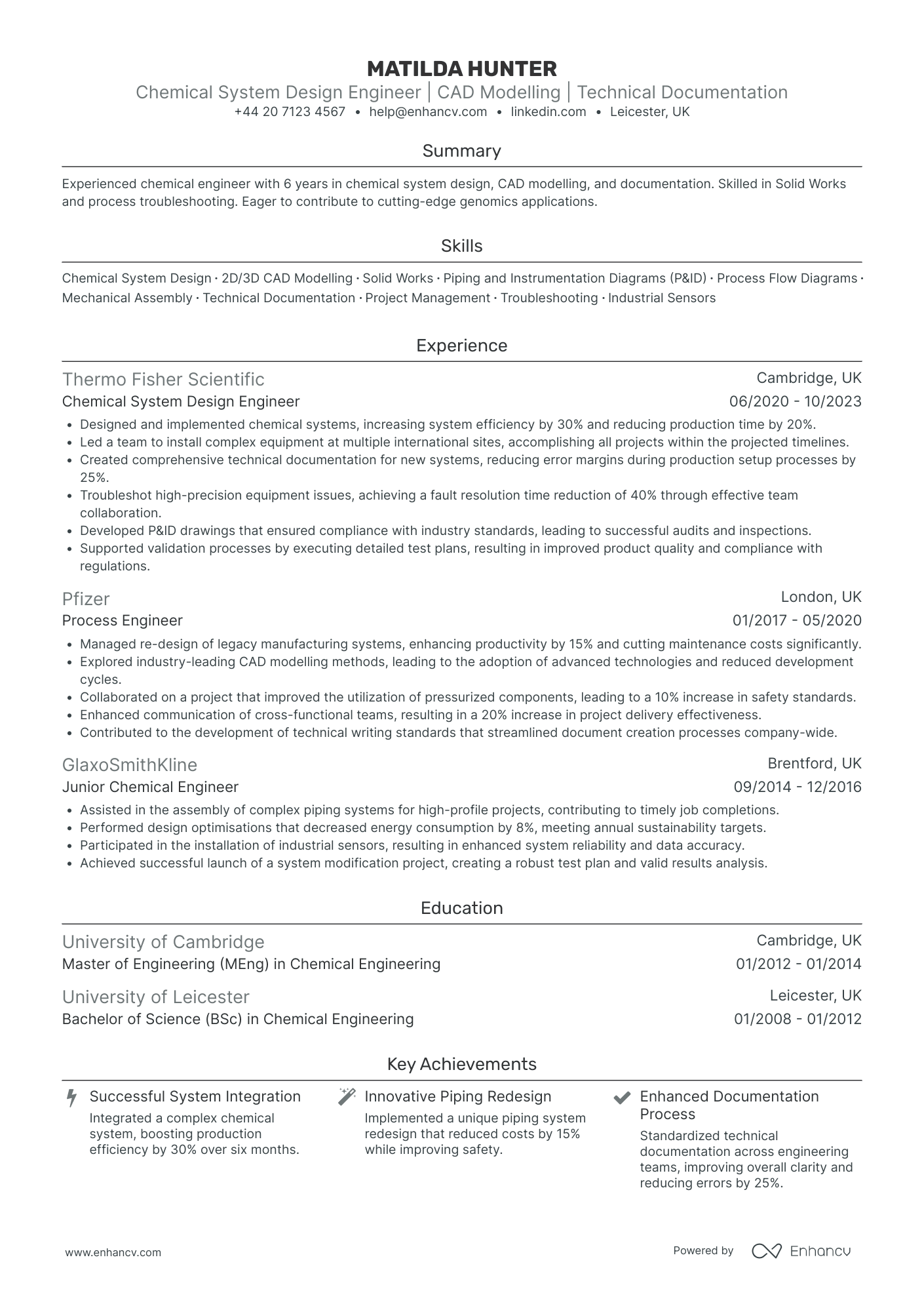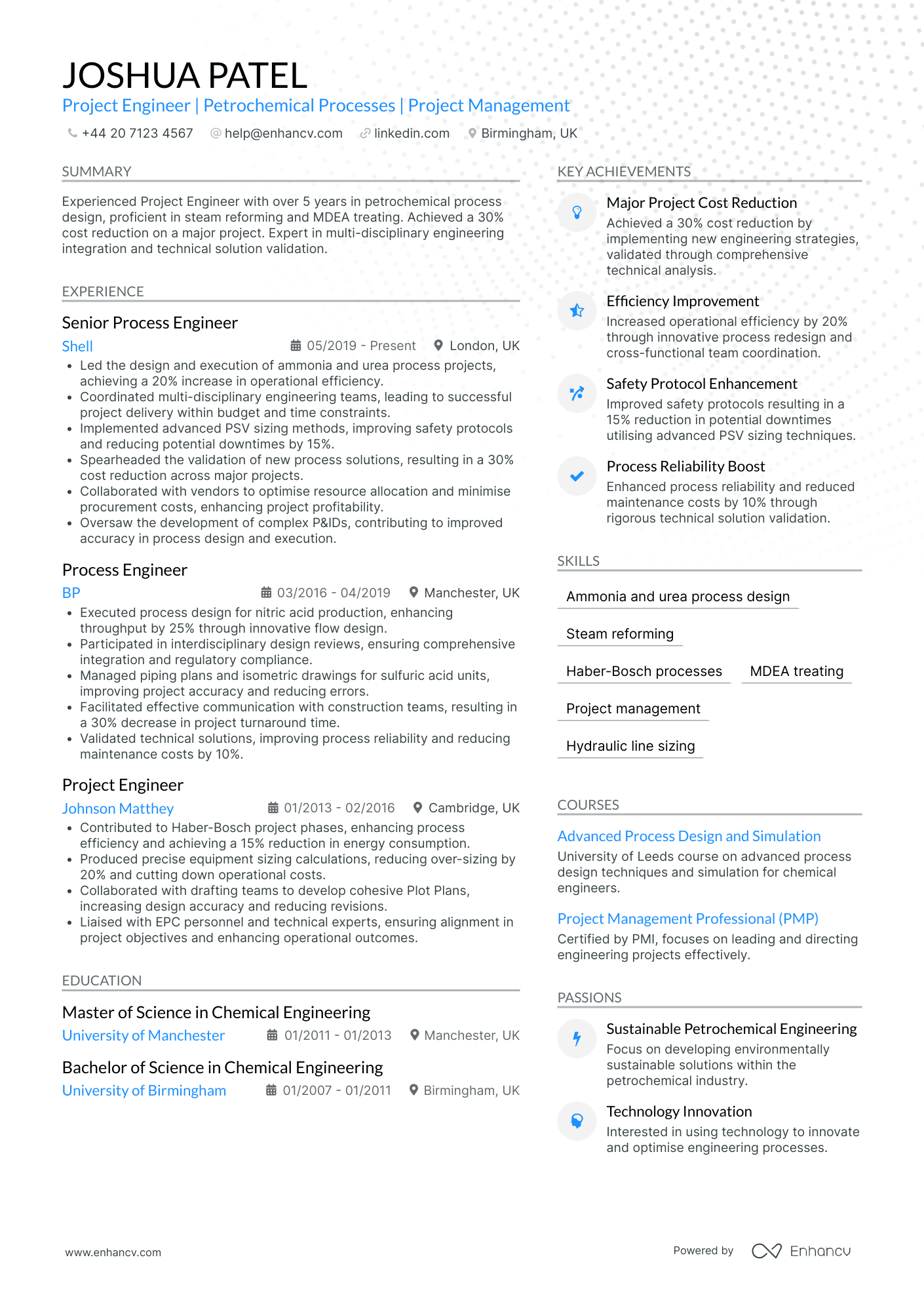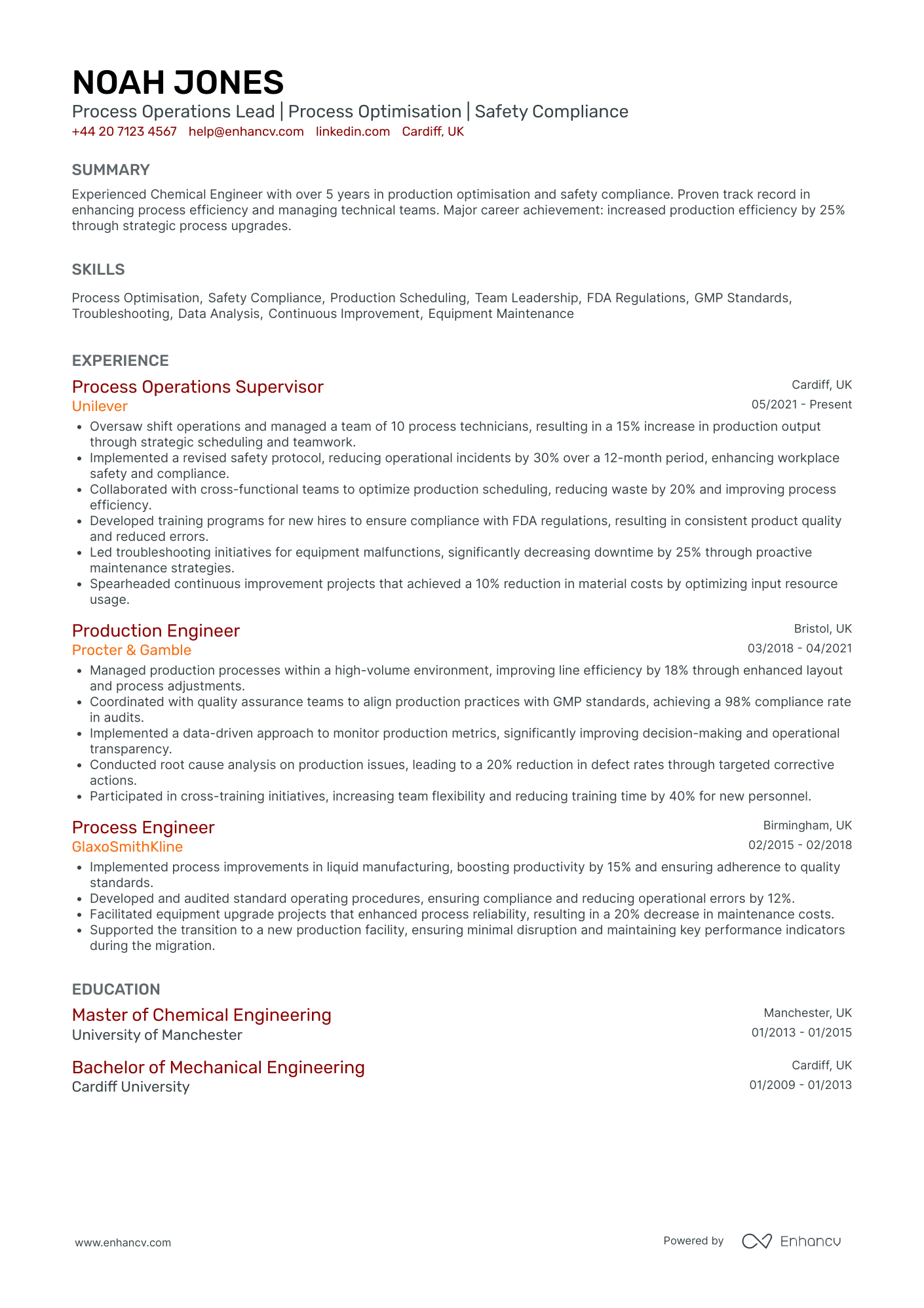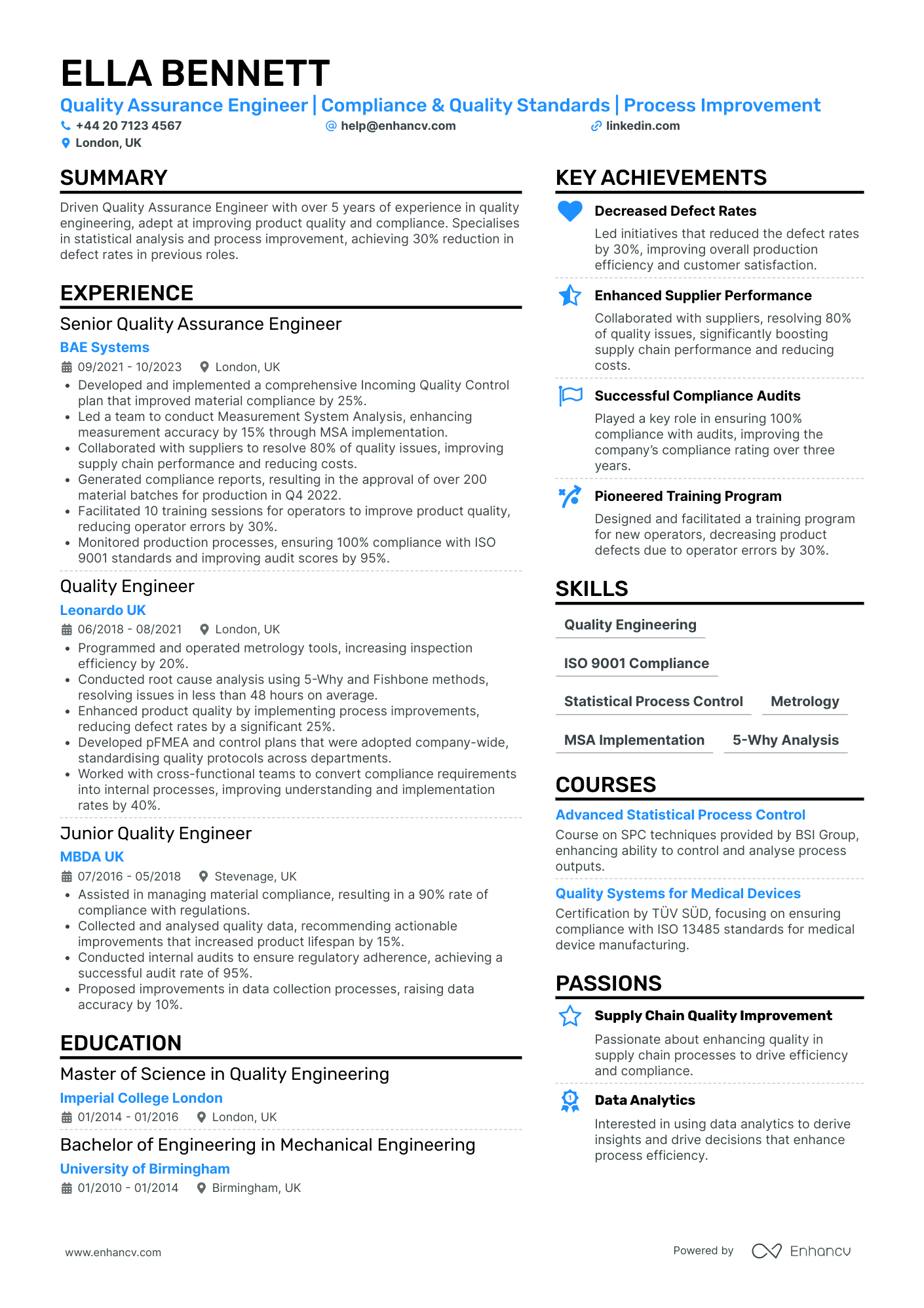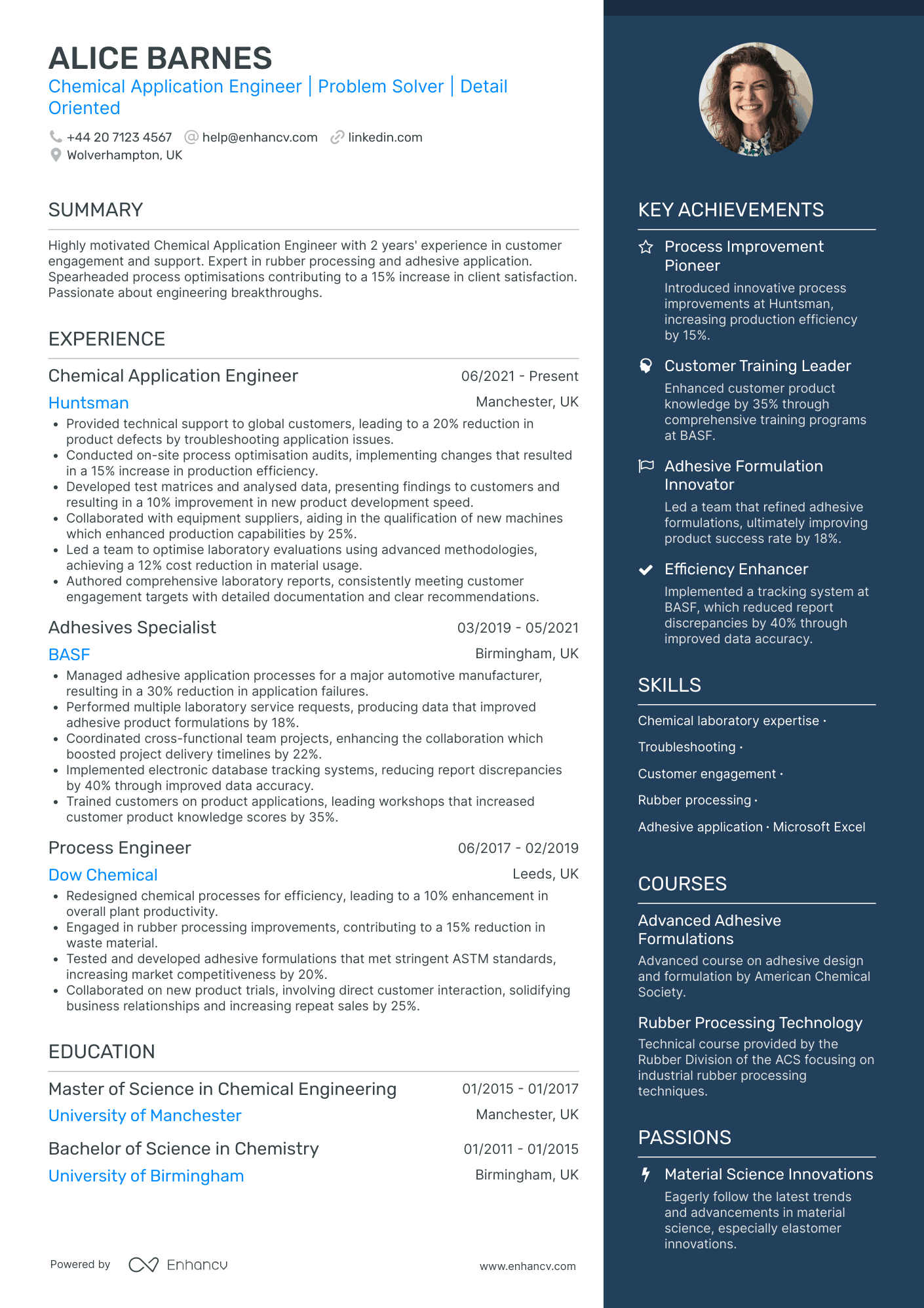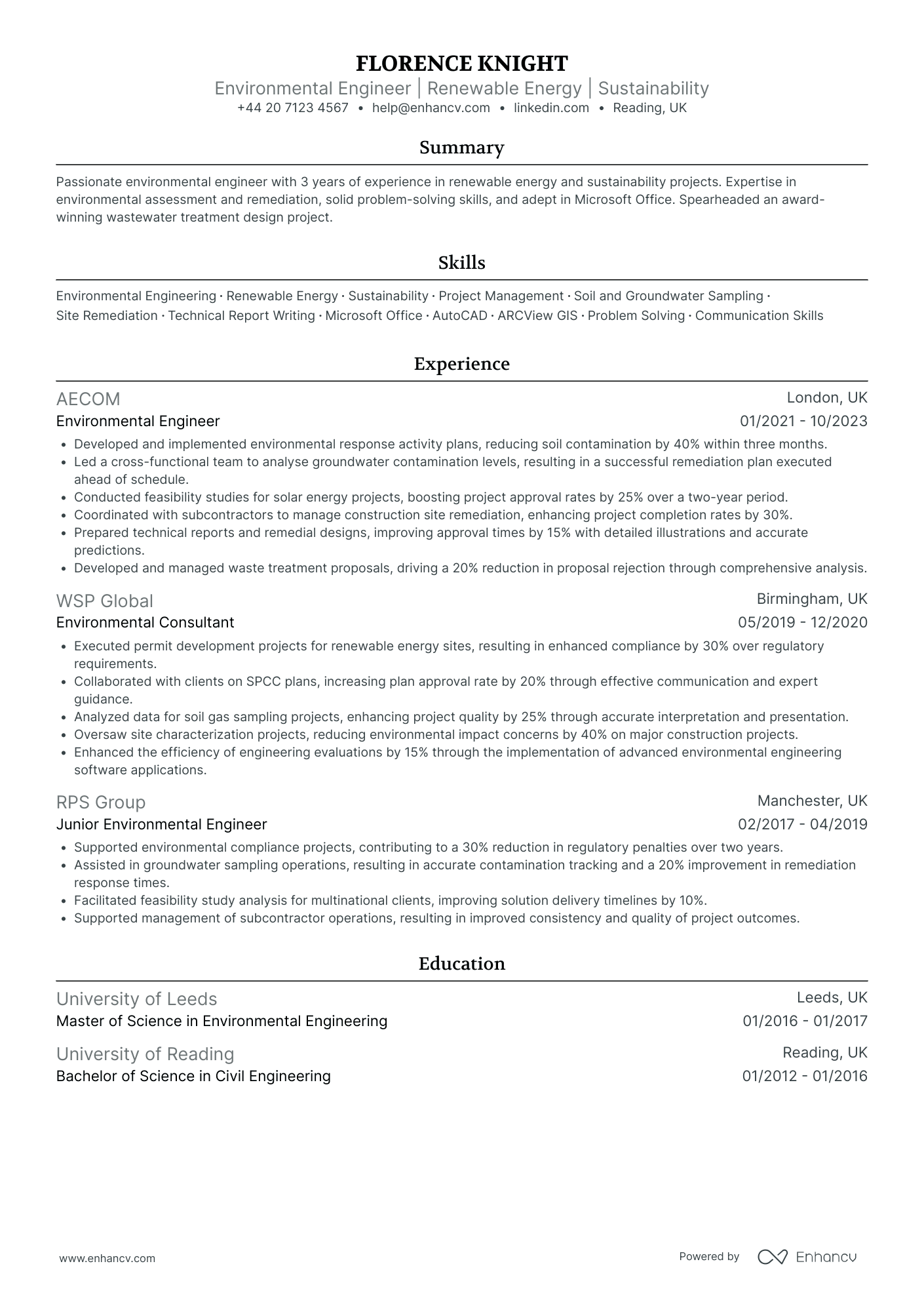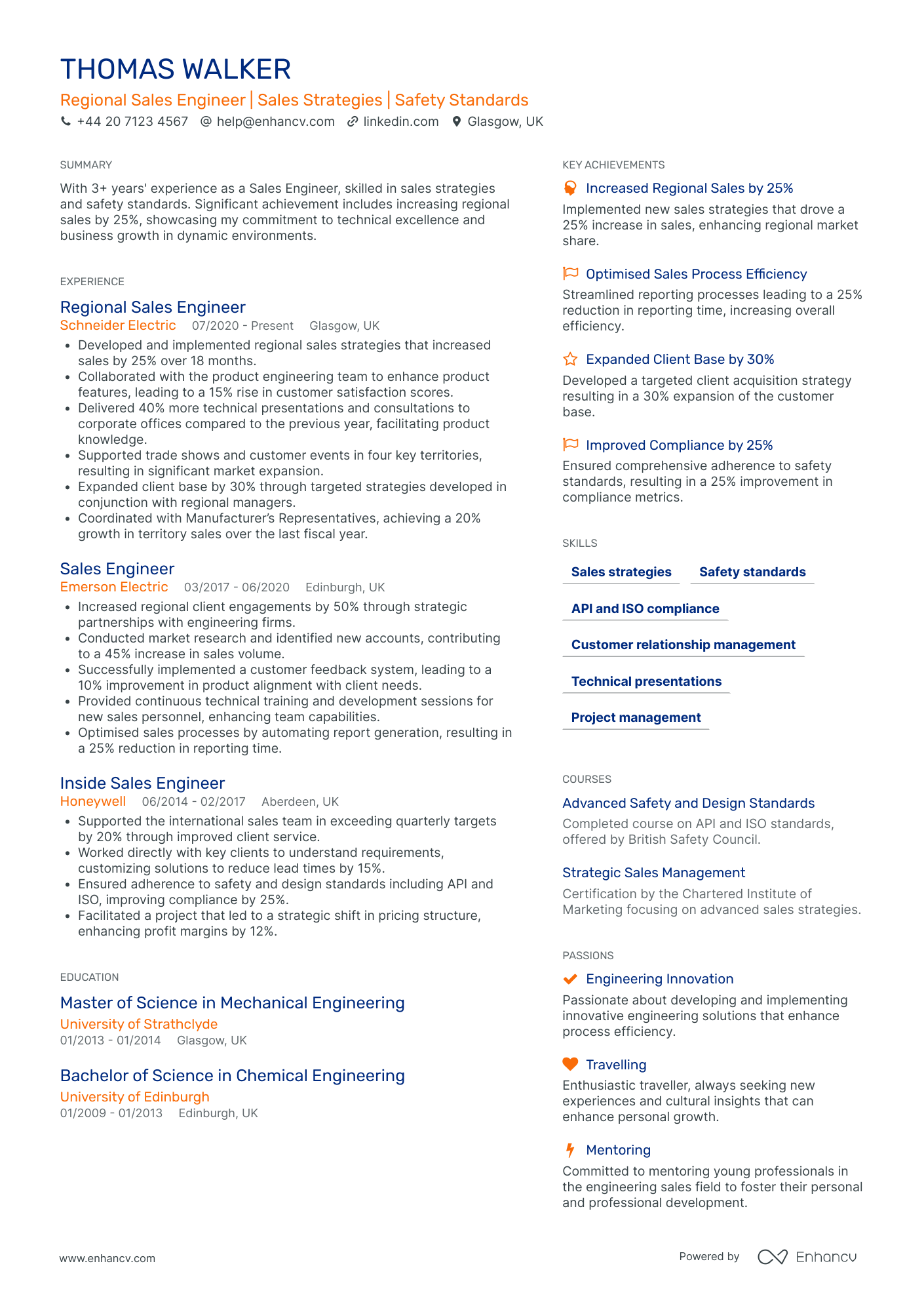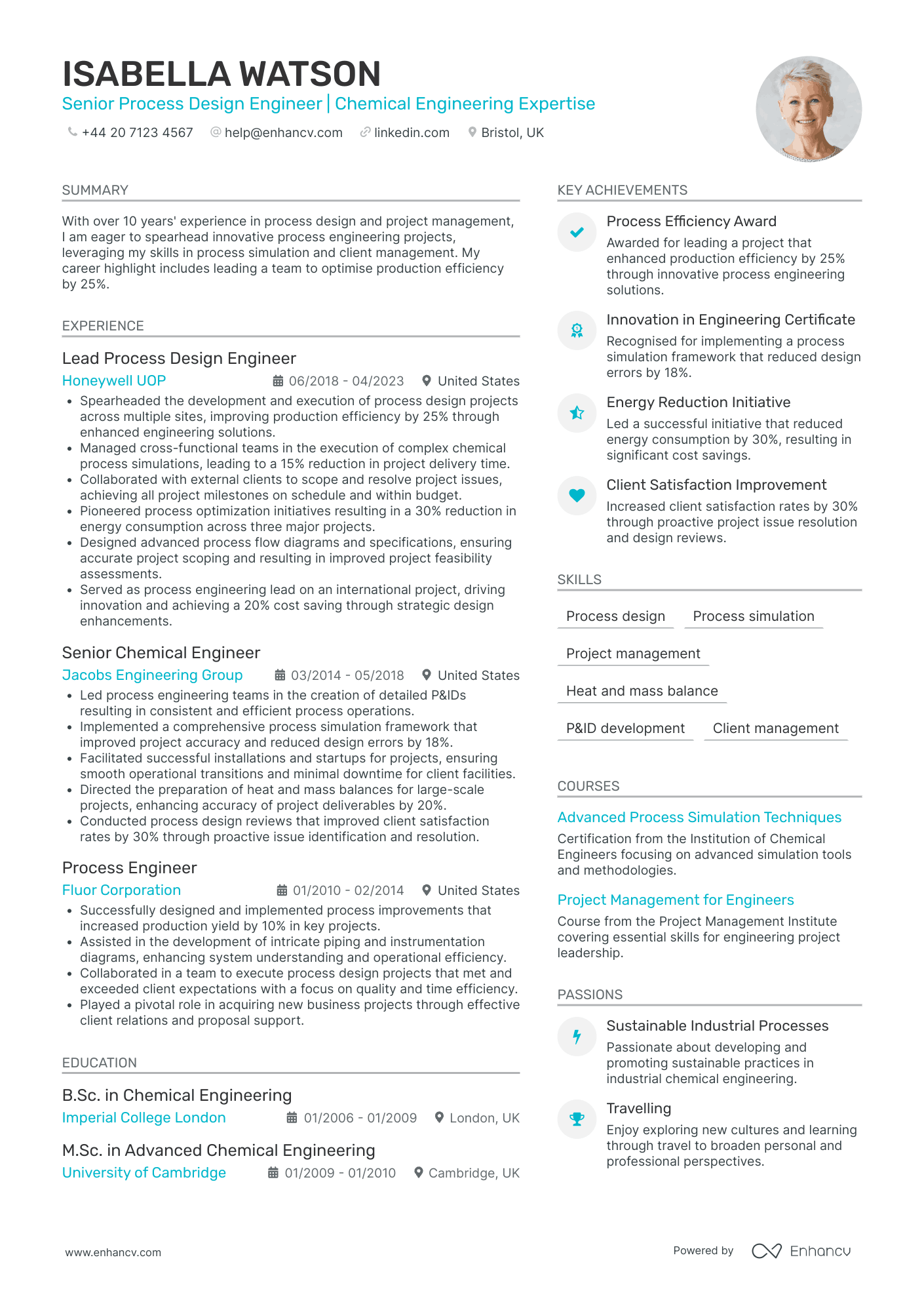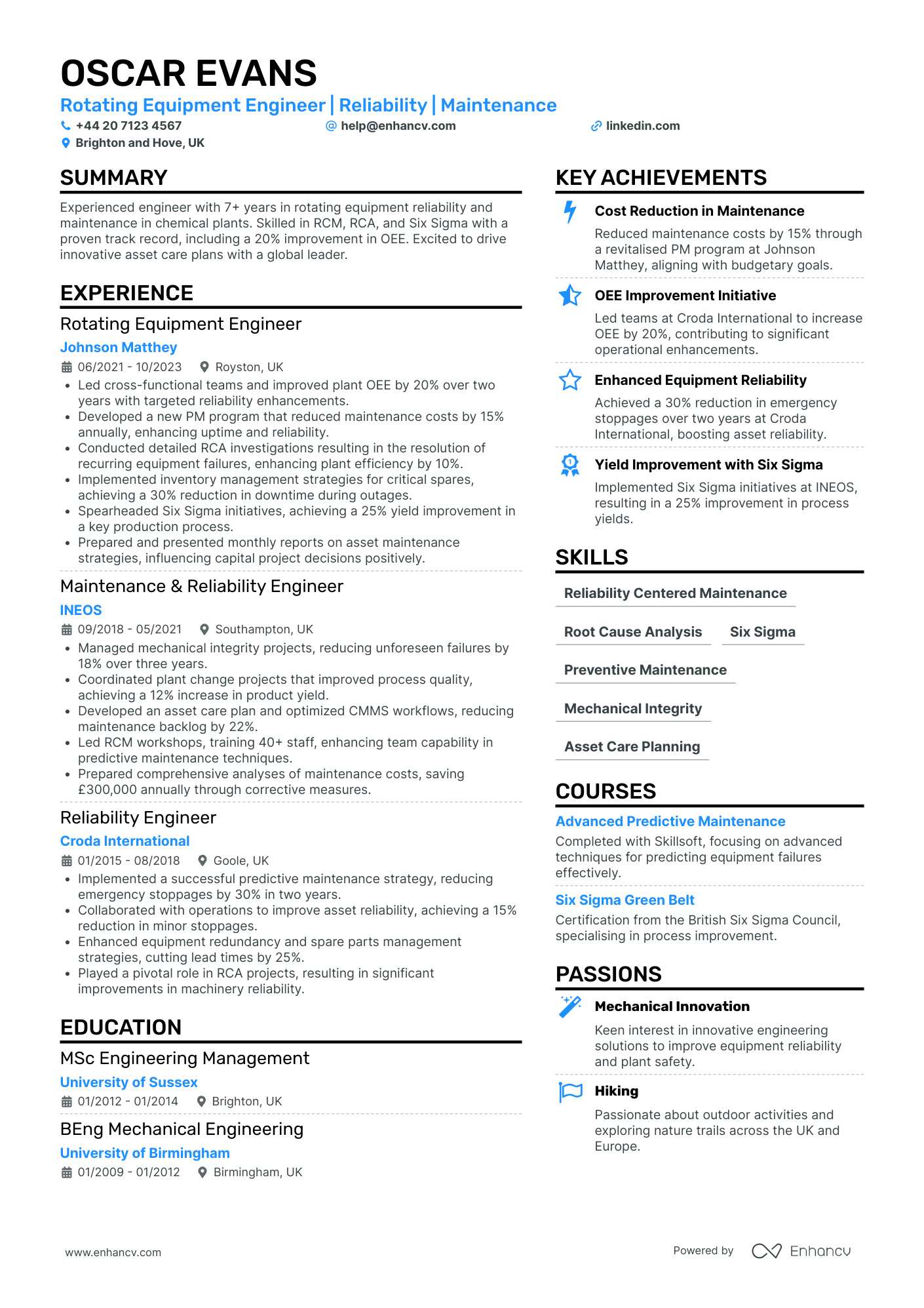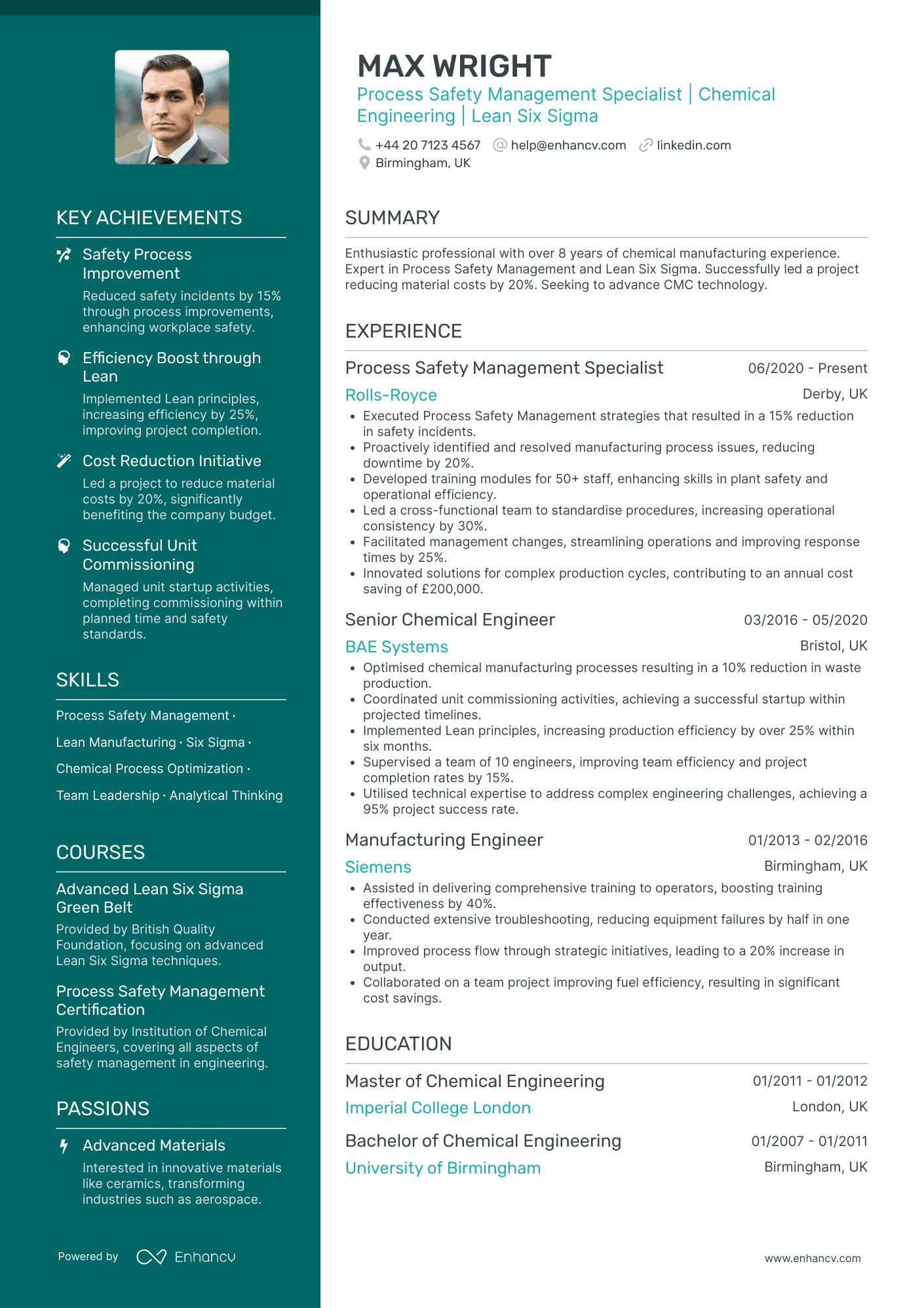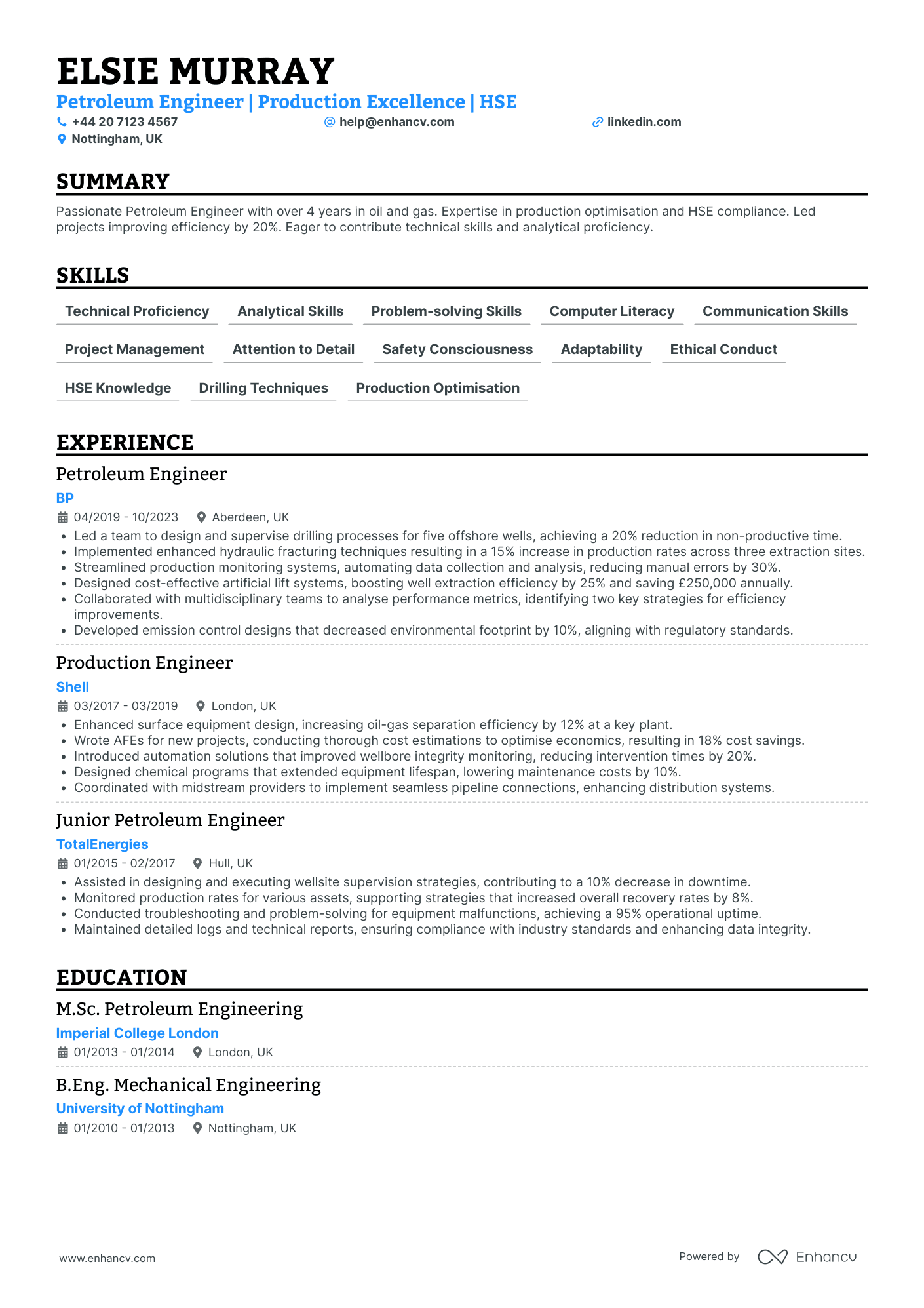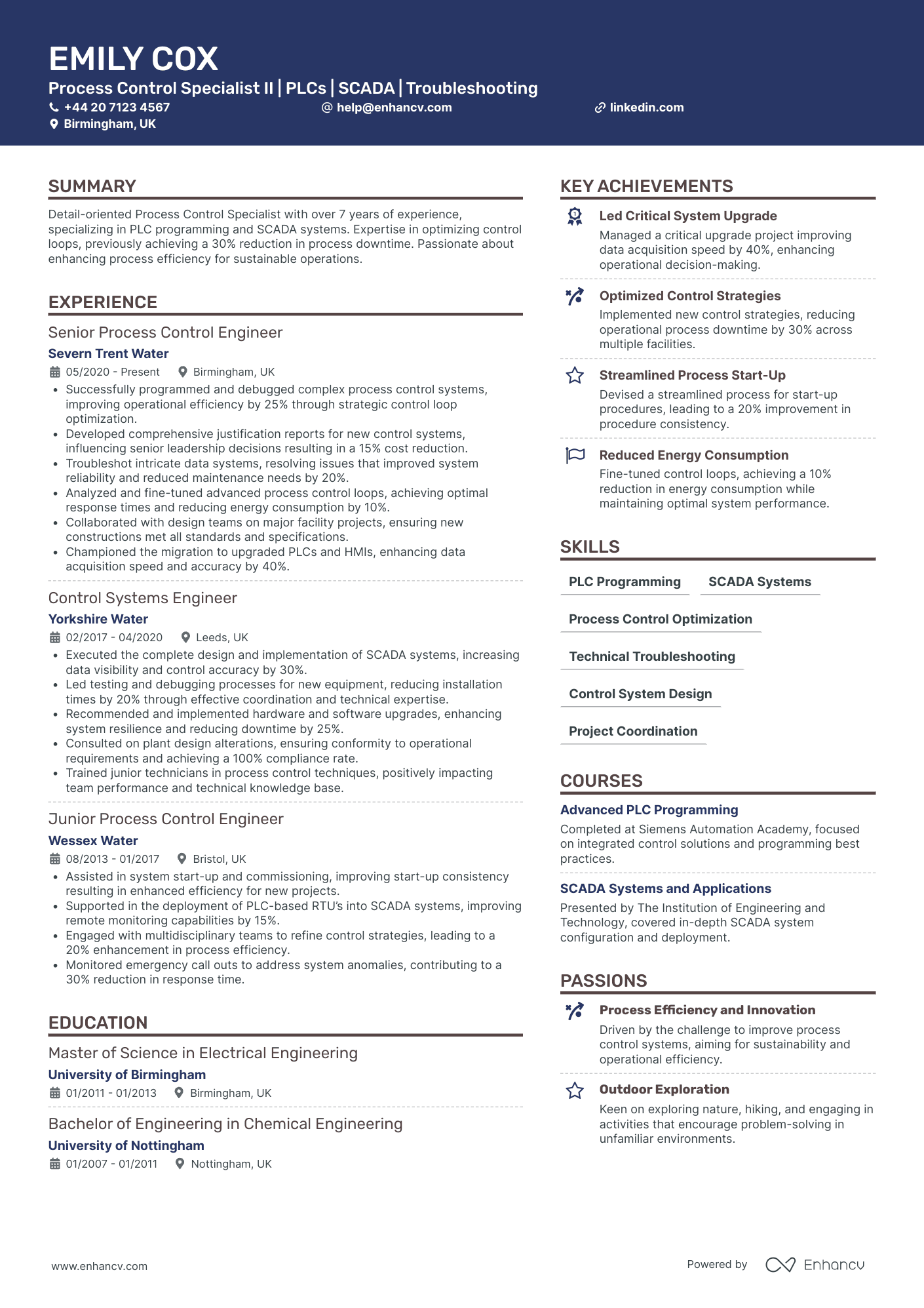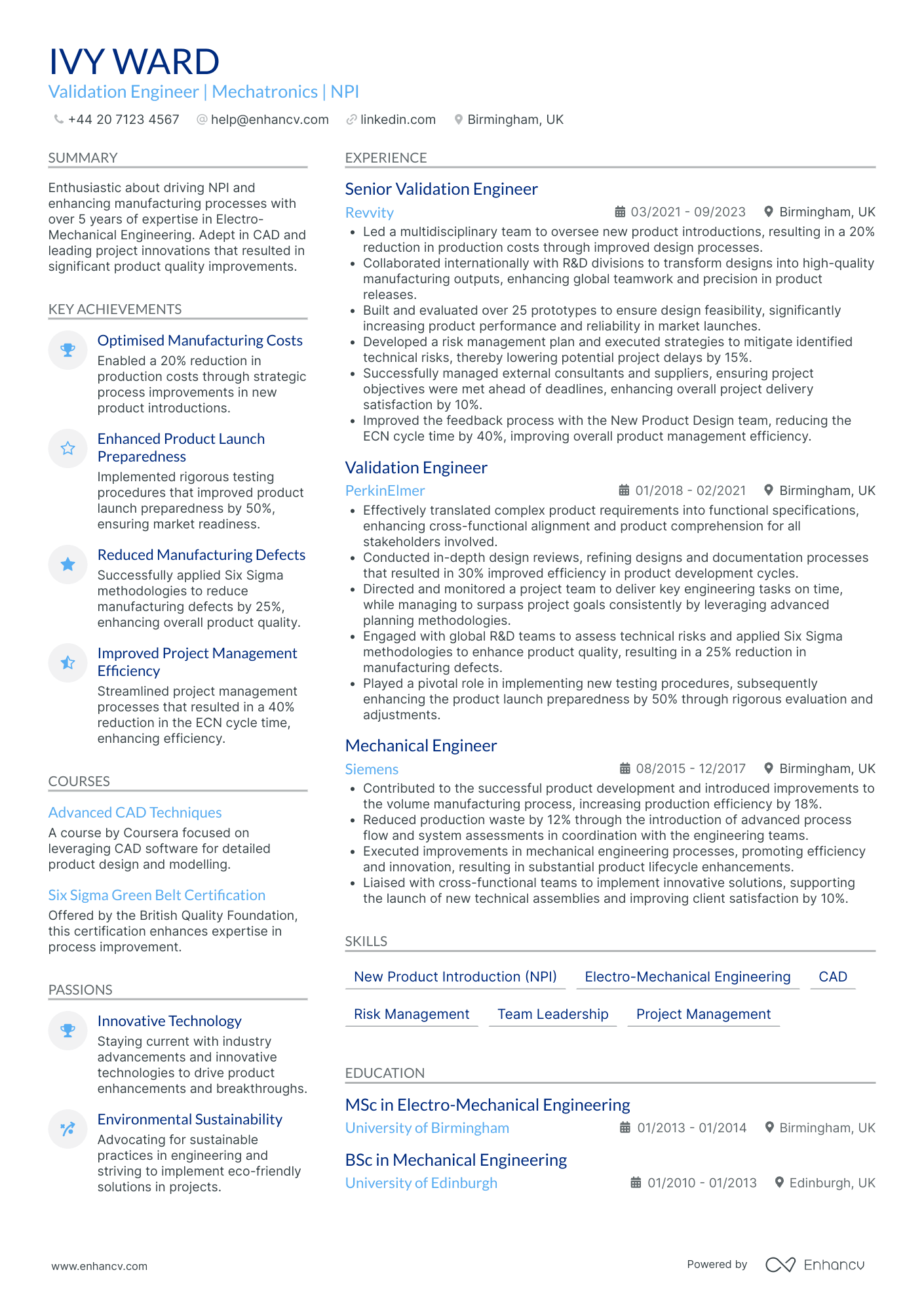Crafting a CV that effectively showcases your expertise in process optimisation while remaining succinct can be a daunting task for a chemical engineer. Our guide provides tailored advice on structuring your experience and skills to highlight your proficiency in this area, ensuring your CV stands out to potential employers.
- Answer job requirements with your chemical engineer CV and experience;
- Curate your academic background and certificates, following industry-leading CV examples;
- Select from +10 niche skills to match the ideal candidate profile
- Write a more succinct experience section that consists of all the right details.
Do you need more specific insights into writing your chemical engineer CV? Our guides focus on unique insights for each individual role:
Resume examples for chemical engineer
By Experience
Junior Chemical Engineer
- Strategic Integration of Methodologies - The CV skillfully highlights Arthur's proficiency in Six Sigma and LEAN manufacturing processes, which are critical for maximizing efficiency and quality in chemical engineering. By implementing these methodologies, Arthur has demonstrably enhanced process efficacy and waste management.
- Cross-disciplinary Experience through Internships and Collaborations - Arthur’s career trajectory features collaborations with diverse teams and roles, from a Process Development Intern at BASF to a Chemical Engineer at Johnson Matthey. This cross-functional experience equips him with versatility and adaptability to tackle complex engineering challenges.
- Impactful Achievements with Quantitative Evidence - Arthur’s CV is structured to showcase significant achievements, such as reducing process cycle times by 15% and cutting production costs by 5% annually. These accomplishments not only demonstrate his technical ability but also underline his contributions to business efficiencies.
By Role
Chemical Process Engineer
- Effective Visual Hierarchy - The CV employs a clear visual hierarchy that guides the reader’s eye naturally through the sections, making it easy to follow. Headings are bold and distinct, with bullet points used strategically to enhance readability and convey information succinctly.
- Steady Career Advancement - The candidate demonstrates a consistent upward trajectory, reflecting growth through various roles in the renewable energy sector. Over a decade, they progress from roles such as Energy Analyst to Senior Manager, highlighting a dedication to environmental impact and energy sustainability.
- Utilization of State-of-the-Art Tools - This CV showcases proficiency in cutting-edge industry-specific tools such as Python for data analysis, Tableau for visualization, and advanced GIS applications, which suggests an ability to leverage technology for strategic decision-making in environmental consulting.
Senior Chemical Engineer
- Emphasizes clear career progression - The CV highlights a robust career trajectory that showcases the individual’s steady rise from a junior role to a senior project manager position within six years. This progression is reinforced by regular promotions, underscoring their ability to adapt and excel in increasingly challenging roles while consistently contributing to company success.
- Demonstrates technical expertise with industry-specific tools - The CV stands out by detailing proficiency with cutting-edge tools and software relevant to the tech industry, such as Python, SQL, and Tableau. This technical depth is complemented by the use of agile methodologies and cloud platforms, which are critical for software development and data analysis roles, highlighting the candidate’s readiness to meet the industry’s evolving demands.
- Showcases leadership and interpersonal skills - Remarkable for its emphasis on soft skills, the CV illustrates exceptional leadership and team-building abilities through examples of successfully managed projects and collaborative achievements. It highlights mentorship experience and the development of junior staff, which is vital for fostering a positive and productive work environment.
Chemical Plant Engineer
- Demonstrates strategic problem-solving with industry-specific techniques - Emily Cox's CV impressively highlights her use of advanced analytical methods to achieve a 20% enhancement in product quality and a 25% improvement in corrosion standards. This technical depth, particularly in niche areas like NADCAP auditing and corrosion testing, signifies her expertise in elevating operational standards within the plant chemical engineering space.
- Progressive career trajectory and diversified industry exposure - The transition from a Junior Chemical Engineer to a Senior Chemical Engineer over less than a decade showcases Emily's rapid career growth, driven by her accomplishments in notable companies like Rolls-Royce and BAE Systems. Her varied experiences across different facets of chemical engineering emphasize her agility and the capacity for cross-functional collaboration.
- Highlights substantial operational and environmental impacts - By emphasizing achievements like cutting compliance costs by 30% and effluent discharge levels by 35%, Emily strategically positions her contributions in terms of business and environmental benefits. These accomplishments reflect her commitment to not only meeting but surpassing industrial standards, thereby solidifying her reputation as a leader in environmental safety and chemical process optimization.
Chemical Production Engineer
- Clarity and Structured Presentation - Sophia Foster's CV is presented with clear headings and sections that delineate her qualifications and experiences. Each section is concise and focused, allowing for easy navigation and quick comprehension of her career highlights and skills pertinent to safety, process, and project engineering.
- Strong Career Trajectory and Growth - This CV showcases a progressive career path through the chemical industry, starting from a Junior Process Engineer at GlaxoSmithKline to an HSE Manager at BASF UK. It reflects substantial growth both in terms of leadership roles and expertise, highlighting her transition from process engineering tasks to managing safety standards and operational efficiencies.
- Achievement-Oriented Impact - The document is particularly compelling with its emphasis on achievements that link directly to business outcomes. For instance, the 40% reduction in incident rates and 20% increase in productivity are not just numbers; they underscore her impact in enhancing safety and efficiency, thus directly contributing to organizational success.
Chemical Safety Engineer
- Strategic Career Progression - Sophia Brooks demonstrates a clear and strategic career trajectory from her initial role as a Safety Engineer to her current position as a Senior Process Safety Engineer at BP plc. This progression reflects not only her growth within the industry but also her increasing scope of responsibility, from managing safety compliance efforts to leading cross-functional hazard analysis workshops and collaborating with external regulatory bodies.
- Industry-Specific Technical Depth - The CV is rich in technical depth specific to the field of process safety engineering, with mention of sophisticated methodologies like process safety management systems, risk assessment tools, and process hazard analysis. These elements highlight her advanced capabilities in identifying and mitigating risks in high-hazard environments, and her proactive role in developing new risk assessment tools showcases innovative problem-solving skills.
- Leadership and Impactful Achievements - A strong emphasis on leadership is evident, especially in roles such as the Process Safety Manager at Shell UK Limited, where she mentored a team, boosting productivity by 30%. Her leadership in implementing effective safety systems showcases her ability to reduce safety incidents significantly, achieving a remarkable 30% reduction, which underscores her impact on operational safety and compliance.
Chemical Research Engineer
- Impactful achievements with business relevance - Sienna West's CV lists significant achievements, such as leading a catalytic CO2 conversion project that improved efficiency by 25% and contributed to patented CO2 utilization technology, which enhanced yields by 30%. These accomplishments illustrate her ability to drive impactful business results that contribute to advancing sustainable technologies.
- Diverse technical expertise in industry-specific tools - The CV highlights Sienna's proficiency with specialized tools like AspenPlus for process simulation and analytical instruments like GC-MS and FTIR. This technical depth demonstrates her capability to enhance process optimization and laboratory efficiency, key areas in the chemical engineering field.
- Career trajectory and industry-focused growth - Sienna's career progression from a Process Development Engineer to a Chemical Process Engineer signifies her growing expertise and leadership in CO2 utilization processes. Each role showcases advanced responsibilities and increasing complexity in projects, underscoring her deepening knowledge and commitment to the chemical engineering industry.
Chemical Systems Engineer
- Well-structured and concise presentation - The CV presents the candidate's qualifications and experiences in a clear and organized manner, making it easy for potential employers to quickly grasp their expertise in chemical engineering and related domains.
- Impressive career progression - Matilda Hunter's career trajectory showcases clear growth, with a progression from a Junior Chemical Engineer to a Chemical System Design Engineer, reflecting both her skill development and readiness for increased responsibilities.
- Emphasis on technical skills and methodologies - The CV highlights industry-specific tools such as Solid Works and CAD modelling, demonstrating the candidate's proficiency with engineering design technologies essential for chemical systems.
Chemical Project Engineer
- Clear and Concise Content Presentation - The CV is well-structured and easy to navigate, with sections dedicated to key areas such as experience, education, skills, and achievements. Each section provides clear and concise bullet points that highlight significant responsibilities and accomplishments, making it easy for employers to quickly grasp the candidate's qualifications.
- Strong Career Trajectory and Growth - Joshua Patel has demonstrated a clear upward career trajectory, advancing from a Project Engineer at Johnson Matthey to a Senior Process Engineer at Shell. His progression is marked by an increasing level of responsibility and impact, showcasing his ability to grow and excel within the petrochemical industry.
- Unique Industry-Specific Expertise - The CV includes specialized technical skills and methodologies specific to the petrochemical industry, such as steam reforming, MDEA treating, and advanced PSV sizing methods. This technical depth highlights Joshua’s proficiency in complex engineering processes and his capability to deliver innovative solutions in a specialized field.
Chemical Operations Engineer
- Structured and Concise Presentation - The CV is clearly laid out with a logical flow, starting with a header that immediately introduces Noah's credentials and contact details. Each section is presented concisely, allowing recruiters to quickly grasp his qualifications, experience, and skills without extraneous information.
- Demonstration of Career Growth - Noah's career trajectory shows a clear path of growth from a Process Engineer to a Process Operations Lead. He has progressed through roles at GlaxoSmithKline, Procter & Gamble, and Unilever, demonstrating increased responsibilities and achievements in process optimization and safety compliance.
- Impactful Industry Achievements - The CV details key achievements that not only cite impressive percentage improvements but also demonstrate his ability to positively impact business operations. For instance, Noah's efforts in reducing operational incidents and material costs have tangible results that align with organizational goals for efficiency and safety.
Chemical Quality Assurance Engineer
- Concise and Structured Presentation - The CV is organized in a clear and concise manner, with distinct sections for experience, education, and skills. This allows for easy navigation and ensures that key elements stand out to the reader. Bullet points in the experience section emphasize achievements and responsibilities effectively, highlighting Ella Bennett's ability to present complex professional details succinctly.
- Strong Career Progression - Ella’s career trajectory demonstrates clear growth from a Junior Quality Engineer to a Senior Quality Assurance Engineer within prominent organizations. Each role has built upon the last, showcasing her ability to ascend within the industry. The CV effectively highlights her advancement in responsibilities, indicating her competence and commitment to professional development.
- Industry-Specific Expertise - The CV displays a deep understanding of industry-specific methodologies and tools like MSA implementation, 5-Why analysis, and statistical process control. It reflects the technical depth required for a Quality Assurance Engineer, alongside her experience with ISO standards and compliance, which are critical for ensuring product excellence and regulatory adherence.
Chemical Application Engineer
- Comprehensive Career Progression - Alice Barnes' CV effectively illustrates a dynamic career trajectory, showing a clear path of growth from Process Engineer to Chemical Application Engineer. Each role showcases a step up in responsibilities and complexity, enabling her to demonstrate enhanced skills and expertise in chemical engineering, highlighting her ability to adapt and excel in various industry niches.
- Impactful Achievements with Business Relevance - The CV effectively quantifies Alice's achievements using specific metrics, such as a 15% increase in client satisfaction and a 30% reduction in application failures. These accomplishments not only demonstrate her technical proficiency but also underline the tangible business outcomes she has driven, which is critical for highlighting her value to potential employers.
- Diverse Skill Set and Continuous Learning - The inclusion of skills, education, and additional courses like 'Advanced Adhesive Formulations' and 'Rubber Processing Technology' shows Alice's commitment to continuous development. It demonstrates her comprehensive understanding of the industry, combining foundational degree qualifications with specialized training that enhances her ability to solve complex engineering challenges.
Chemical Environmental Engineer
- Structured Presentation with Clear Career Path - The CV is well-organized, providing a coherent trajectory of Florence's career from a Junior Environmental Engineer to more senior roles at prominent engineering firms. It clearly tracks her professional growth, emphasizing her expanding responsibilities and achievements in the field of environmental engineering.
- Impressive Technical Proficiency and Industry-Specific Skills - Florence's profile showcases her expertise in using industry-standard tools like AutoCAD and ARCView GIS. She has a solid grasp of advanced methodologies critical for environmental assessment and remediation, which highlights her technical depth and ability to implement effective solutions in challenging environments.
- Notable Achievements with Significant Business Impact - Her CV is rich with substantial accomplishments that go beyond mere numbers. The impact of her work is evident in projects like the 60% reduction in contamination levels and the implementation of sustainability initiatives that cut carbon footprints by 30%. These achievements demonstrate her capability to drive positive environmental and business outcomes.
Chemical Sales Engineer
- Clear and Logical Structure - The CV is organized in a way that allows for easy navigation and quick identification of key points by using clearly defined sections and bullet points. This structured approach ensures that the most pertinent information stands out, making it easier for hiring managers to assess the candidate's qualifications effectively.
- Dynamic Career Progression - A noticeable trajectory of growth is evident in the candidate’s career, highlighted by promotions from entry-level positions to senior roles. This upward progression reflects not only increased responsibility but also the individual's ability to adapt and excel in their industry, making them a valuable asset to future employers.
- Implementation of Industry-Specific Tools and Methods - A particular strength of the CV lies in its attention to industry-specific methodologies, showcasing proficiency with specialized software and techniques that are critical in the field. This technical depth emphasizes the candidate's hands-on experience in leveraging advanced tools to drive project success.
Chemical Design Engineer
- Clarity in Content Presentation - The CV is well-organized, showcasing each section with clear headings and concise bullet points. This structure allows for a quick overview of Isabella's career, making it easy for recruiters to identify key skills and achievements. Each section is tailored to highlight relevant experience, skills, and education, ensuring no space is wasted with unnecessary details.
- Career Trajectory and Professional Growth - Isabella's career showcases a clear trajectory of advancement in the chemical engineering field. Starting as a Process Engineer at Fluor Corporation and progressing to a Lead Process Design Engineer at Honeywell UOP, her journey highlights consistent promotions and increasing responsibilities. This growth is indicative of her competence and dedication to her profession.
- Industry-Specific Skills and Tools - The CV highlights Isabella's proficiency with essential industry tools like HYSYS, Aspen Plus, and AutoCAD, alongside her mastery in process simulation and P&ID development. Her technical depth is further showcased by certifications in advanced process simulation techniques, signaling a commitment to continuous learning and staying updated with industry advances.
Chemical Equipment Engineer
- Strategically Detailed and Structured Content - The CV is clearly structured to provide a comprehensive yet concise overview of the candidate's career. Each section is logically ordered, making it easy to navigate through experiences, projects, and skills, which are presented in a direct and succinct manner. Bullet points are effectively used to highlight key achievements and responsibilities, ensuring that the most relevant information is instantly accessible.
- Impressive Career Growth and Industry Experience - Oscar Evans demonstrates a clear trajectory of professional growth, transitioning from roles such as Reliability Engineer to more complex positions as a Rotating Equipment Engineer. This progression is through major industry players, indicating strong adaptability and expertise in chemical plant environments, which are crucial for the specialized area of rotating equipment and maintenance engineering.
- Significant Impact through Quantifiable Achievements - The CV goes beyond listing roles and responsibilities by effectively showcasing the candidate’s impactful achievements. For instance, a 20% improvement in OEE and a 15% reduction in maintenance costs at Johnson Matthey underscore Oscar’s ability to drive business efficiency and financial outcomes, reinforcing the value he brings to potential employers.
Chemical Manufacturing Engineer
- Compelling Structure and Conciseness - Max Wright's CV is meticulously structured, presenting a clear progression of career roles and accomplishments. It follows a logical flow beginning with a strong summary and offers easy-to-digest sections for experience, education, and skills, ensuring that the information is both thorough and concise.
- Demonstrated Growth in Career - The CV illustrates a clear trajectory of advancement within the chemical engineering industry, moving from a role as a Manufacturing Engineer to positions with greater responsibilities such as Senior Chemical Engineer and finally a Process Safety Management Specialist. This showcases Max's dedication to professional growth and adaptation to challenging roles over time.
- Focus on Process Safety and Efficiency - Max's CV demonstrates a deep understanding of industry-specific methodologies such as Process Safety Management and Lean Six Sigma. The emphasis on reducing safety incidents and implementing efficiency measures not only highlights technical expertise but also indicates a commitment to sustainable and cost-effective practices.
Chemical Petroleum Engineer
- Highly Structured Education and Credentials - Elsie Murray’s CV provides a well-organized presentation of her academic and professional credentials, displaying her strong educational foundation with advanced degrees in petroleum and mechanical engineering from prestigious institutions. It sets a solid backdrop reinforcing her technical expertise.
- Progressive Career Pathway - The CV skillfully illustrates Elsie’s career growth from a Junior Petroleum Engineer at TotalEnergies to a senior Petroleum Engineer role at BP. It highlights her steady progression, demonstrating a clear trajectory of increasing responsibility and leadership within the oil and gas industry.
- Innovation in Industry Techniques - Elsie’s CV stands out with a focus on advanced methodologies and technology deployment, like "enhanced hydraulic fracturing techniques" and "automation solutions." These industry-specific elements underscore her commitment to cutting-edge practices and efficiency improvements in petroleum engineering.
Chemical Control Systems Engineer
- Structured with clarity and focus - Emily's CV is exceptionally well-organized, beginning with a concise summary that succinctly captures her expertise and career focus. The document flows logically, with each section clearly demarcated, allowing for easy navigation and immediate understanding of her qualifications and achievements.
- Evidence of significant career growth and specialization - Over the years, Emily has demonstrated a clear progression in her career, advancing from a Junior Process Control Engineer to a Senior Process Control Engineer. This trajectory highlights her dedication to the field and her growing expertise in process control systems, marked by increased responsibilities and impactful contributions in progressively senior roles.
- Technical acumen and industry-specific knowledge - The CV highlights Emily's deep industry knowledge and technical prowess through her extensive experience with PLCs and SCADA systems. Her proactive role in optimizing control loops and implementing advanced control strategies demonstrates her ability to leverage these tools for substantial operational improvements.
Chemical Validation Engineer
- Effective Content Presentation - The CV is well-structured and provides a clear, concise overview of Ivy Ward's career. The use of bullet points effectively highlights key responsibilities and achievements, making it easy for the reader to quickly grasp the scope of her expertise and accomplishments. Each section is organized logically, which helps to present her career trajectory in a coherent manner.
- Impressive Career Trajectory - Ivy Ward's career shows a clear path of progression, starting as a Mechanical Engineer and advancing to a Senior Validation Engineer role. Throughout her experience, particularly at Revvity and PerkinElmer, she has assumed increasing responsibility, which indicates her competence and ability to deliver substantial contributions to her teams and projects. This trajectory aligns well with someone who specializes in Validation Engineering and Mechatronics within the NPI process.
- Depth in Industry-Specific Expertise - The CV highlights Ivy Ward's extensive experience with tools and methodologies relevant to her industry, such as CAD, Six Sigma, and risk management. Her knowledge in prototyping, optical systems, and DFM (DfX) underscores her technical depth. Furthermore, her advanced studies in Electro-Mechanical Engineering tie back to her proficiency in using these specialized tools, which are crucial in enhancing product performance and process efficiency.
Structuring your chemical engineer CV layout: four factors to keep in mind
There are plenty of best practices out there for your CV layout and design. At the end of the day, a clear format and concise CV message should be your top priority. Use your CV design to enhance separate sections, bringing them to the forefront of recruiters' attention. At the same time, you can write content that:
- Follows the reverse chronological order in the experience section by first listing your most recent jobs;
- Incorporates your contact information in the header, but do skip out on the CV photo for roles in the UK;
- Is spotlighted in the most important sections of your CV, e.g. the summary or objective, experience, education, etc. to show just how you meet the job requirements;
- Is no longer than two-pages. Often, the one-page format can be optimal for your chemical engineer CV.
Before submitting your CV, you may wonder whether to export it in Doc or PDF. With the PDF format, your information and layout stay intact. This is quite useful when your CV is assessed by the Applicant Tracker System (or the ATS) . The ATS is a software that scans your profile for all relevant information and can easily understand latest study on the ATS , which looks at your CV columns, design, and so much more.
PRO TIP
Be mindful of white space; too much can make the CV look sparse, too little can make it look cluttered. Strive for a balance that makes the document easy on the eyes.
The top sections on a chemical engineer CV
- Education and qualifications highlight the core knowledge base necessary for complex chemical processes.
- Relevant work experience demonstrates applied skills and industry familiarity.
- Technical skills section showcases specialised expertise in software and equipment used in chemical engineering.
- Projects and publications exhibit hands-on experience and contributions to the field.
- Professional affiliations and certifications indicate recognised standards of proficiency and commitment to professional development.
What recruiters value on your CV:
- Highlight your understanding of process design and simulation by detailing the software tools you are proficient in, such as Aspen HYSYS, and any significant projects where you applied these skills to optimise chemical processes.
- Emphasise your knowledge of safety and regulatory standards, such as REACH and COSHH, by illustrating how you've implemented these in past roles to ensure compliance in chemical manufacturing environments.
- Document your experience in scaling up chemical reactions from the laboratory to pilot plant or full production scale, mentioning specific techniques and equipment you have used, like reactors or distillation columns.
- Include any experience with sustainable and green chemical engineering practices, for instance, by showcasing projects where you've reduced waste or energy usage in chemical processes.
- Detail your hands-on experience with instrumentation and process control by mentioning specific systems you're familiar with, such as SCADA or DCS, and how you have utilised them to improve process efficiency and product quality.
Recommended reads:
Our checklist for the must-have information in your chemical engineer CV header
Right at the very top of your chemical engineer CV is where you'd find the header section or the space for your contact details, headline, and professional photo. Wondering how to present your the name of the city you live in and the country abbreviation as your address;
- are tailored to the role you're applying for by integrating key job skills and requirements;
- showcase what your unique value is, most often in the form of your most noteworthy accomplishment;
- select your relevant qualifications, skills, or current role to pass the Applicant Tracker System (ATS) assessment. Still not sure how to write your CV headline? Our examples below showcase best practices on creating effective headlines:
Examples of good CV headlines for chemical engineer:
- Chemical Process Engineer | MSc Chemistry | Continuous Improvement | Lean Six Sigma- Green Belt | 5+ Years
- Senior Chemical Engineer | PhD in Chemical Engineering | Petrochemical Expertise | Project Management Professional | 10+ Years
- Graduate Chemical Engineer | BEng Honours | Specialisation in Polymer Science | Industry Placement Achiever | 1 Year Experience
- Principal Chemical Engineer | Chartered Engineer | Reactor Design & Optimisation | Environmental Compliance | 15+ Years
- Chemical Engineering Manager | Process Safety Specialist | Cost Reduction Strategies | MEng, CEng | 12 Years Expertise
- Lead Process Development Engineer | PhD | Biotechnological Processes | Patent Holder | 8 Years in R&D
What's the difference between a chemical engineer CV summary and objective
Why should it matter to you?
- Your chemical engineer CV summary is a showcasing your career ambitions and your unique value. Use the objective to answer why your potential employers should hire you based on goals and ambitions. The objective is the ideal choice for candidates who happen to have less professional experience, but still meet some of the job requirements.
Before you select which one will be more relevant to your experience, have a look at some industry-leading CV summaries and objectives.
CV summaries for a chemical engineer job:
- Seasoned Chemical Engineer with over 12 years of experience in petrochemical processes, adept at process optimisation and plant design. Successfully developed and commercialised a novel catalyst, boosting production efficiency by 40%. Holder of a Master’s degree in Chemical Engineering from Imperial College London.
- Diligent Chemical Engineering professional with a decade's worth of expertise in the pharmaceutical industry. Renowned for excellence in fluid dynamics and thermodynamics, leading to a 20% increase in production yield at GlaxoSmithKline. Spearheaded the integration of a new quality control protocol, setting industry benchmarks.
- Formerly a Senior Software Developer with a passion for sustainable energy solutions, now transitioning into Chemical Engineering. Adept in complex algorithms and data analysis, seeking to leverage a rich 15-year tech background to innovate green chemical processes and contribute to reducing industrial carbon footprint.
- A Mechanical Engineer with a strong foundation in thermodynamics and 8 years of experience in automotive design pivoting to Chemical Engineering. Looking to apply analytical and project management skills to tackle chemical process challenges and drive efficiency in new realms of energy and material development.
- Dynamic recent graduate with a First-Class Honours degree in Chemical Engineering from the University of Manchester. Eager to apply theoretical knowledge and hands-on laboratory experience to assist in the development and optimisation of chemical processes that align with sustainable industry practices.
- Aspiring Chemical Engineer with strong analytical skills, currently completing a PhD in Chemical and Biomolecular Engineering. Desires to apply cutting-edge research knowledge to practical, real-world applications that contribute to advancements in biofuels and renewable energy sectors.
Narrating the details of your chemical engineer CV experience section
Perhaps you've heard it time and time again, but, how you present your experience is what matters the most. Your CV experience section - that details your work history alongside your accomplishments - is the space to spotlight your unqiue expertise and talents. So, avoid solely listing your responsibilities, but instead:
- adverts' keywords and integrate those in your experience section;
- Use your CV to detail how you've been promoted in the past by including experience in the reverse chronological order.
Before you start writing your chemical engineer CV experience section, dive into some industry-leading examples on how to structure your bullets.
Best practices for your CV's work experience section
- Devised and optimised chemical processes at a large-scale manufacturing plant, enhancing efficiency by 15% over two years and significantly reducing environmental impact.
- Conducted detailed process simulations using Aspen HYSYS for the design and analysis of new chemical plant sections, achieving a 5% cost reduction in project capital expenditure.
- Collaborated with cross-functional teams to troubleshoot production issues, resulting in a 20% reduction in downtime and a measurable improvement in product quality.
- Led a process safety management initiative to ensure full compliance with HSE guidelines, which successfully prevented any reportable incidents for three consecutive years.
- Developed and executed process validation protocols for a novel polymer synthesis route, which led to a patented technology and its commercialisation.
- Managed pilot-scale trials for a new catalyst system, contributing to a 10% increase in product yield and significant enhancements in catalyst life span.
- Implemented advanced control strategies for distillation columns that resulted in a 5% increase in separation efficiency and energy savings of £50,000 per year.
- Authored technical reports and Standard Operating Procedures (SOPs) that streamlined processes and were adopted as part of the company’s Best Practice Documentation.
- Represented the company at international conferences, presenting research on green chemistry initiatives that positioned the company as a leader in sustainable chemical engineering.
- Spearheaded the optimisation of distillation processes that led to a 20% increase in efficiency for petrochemical production at BP.
- Managed cross-functional teams in developing a new catalyst system, enhancing product purity by 15% while cutting production costs by £200k annually.
- Implemented advanced process control strategies that reduced energy consumption by 10% per annum, significantly lowering the carbon footprint.
- Oversaw the project management of a £5m plant expansion at BASF, delivering the project 3 months ahead of schedule.
- Developed and enforced stringent safety protocols that decreased the incident rate by 40% over two years.
- Initiated and conducted comprehensive process simulations improving the yield of high-performance polymers by 25%.
- Pioneered a proprietary pharmaceutical compound scale-up, reducing time-to-market by 6 months for AstraZeneca.
- Enhanced the upstream processing of active pharmaceutical ingredients, augmenting throughput by 20%, resulting in a £1.2m revenue increase.
- Authored and secured 3 patents in novel drug delivery methods, positioning the company advantageously in a competitive market.
- Executed a company-wide waste reduction initiative at Shell that eliminated 500 tonnes of hazardous waste per year.
- Collaborated with supply chain partners to streamline raw material delivery, slashing inventory costs by £500k whilst maintaining production timelines.
- Engineered an award-winning water treatment solution that reused 75% of process water, significantly reducing environmental impact and operational costs.
- Directed the design and execution of a £10m reactor upgrade at INEOS, achieving a 30% uplift in production capacity.
- Integrating AI-driven predictive maintenance systems to reduce downtime by 25%, directly impacting the bottom line.
- Authored a widely acclaimed research paper on the use of nano-technology in catalysis, significantly influencing industry practices.
- Functioned as the project lead on a multimillion-pound installation of bio-reactor systems at GlaxoSmithKline, culminating in a 40% boost in biopharmaceutical production.
- Optimised antibody drug conjugate manufacturing processes, leading to a 50% reduction in production time and a 30% cost saving.
- Liaised with regulatory agencies to ensure full compliance with MHRA and FDA guidelines, with zero citations over the tenure.
- Delivered bespoke consultancy on lean manufacturing to AkzoNobel, enabling the client to streamline operations and enhance productivity by 22%.
- Conceived and led a workforce training program that improved technical competency scores across the board by 35%.
- Facilitated the transition to a more sustainable solvent system, reducing VOC emissions by 1800 tonnes per year.
- Innovated a water-soluble film for agrochemical delivery at Syngenta that boosted target delivery efficacy by 50% while minimising environmental leaching.
- Led a tech-transfer project that was pivotal in establishing a manufacturing site in India, expanding the company's global footprint.
- Piloted a continuous flow chemistry initiative that slashed reaction times from hours to minutes, markedly increasing plant throughput.
What to add in your chemical engineer CV experience section with no professional experience
If you don't have the standard nine-to-five professional experience, yet are still keen on applying for the job, here's what you can do:
- List any internships, part-time roles, volunteer experience, or basically any work you've done that meets the job requirements and is in the same industry;
- Showcase any project you've done in your free time (even if you completed them with family and friends) that will hint at your experience and skill set;
- Replace the standard, CV experience section with a strengths or achievements one. This will help you spotlight your transferrable skills that apply to the role.
Recommended reads:
PRO TIP
If applicable, briefly mention a situation where things didn’t go as planned and what you learned from it, demonstrating your ability to learn and adapt.
Mix and match hard and soft skills across your chemical engineer CV
Your skill set play an equally valid role as your experience to your application. That is because recruiters are looking for both:
- hard skills or your aptitude in applying particular technologies
- soft skills or your ability to work in a team using your personal skills, e.g. leadership, time management, etc.
Are you wondering how you should include both hard and soft skills across your chemical engineer CV? Use the:
- skills section to list between ten and twelve technologies that are part of the job requirement (and that you're capable to use);
- strengths and achievements section to detail how you've used particular hard and soft skills that led to great results for you at work;
- summary or objective to spotlight up to three skills that are crucial for the role and how they've helped you optimise your work processes.
One final note - when writing about the skills you have, make sure to match them exactly as they are written in the job ad. Take this precautionary measure to ensure your CV passes the Applicant Tracker System (ATS) assessment.
Top skills for your chemical engineer CV:
Chemical process design
Process simulation and modelling
Chemical reaction engineering
Material science
Thermodynamics
Process optimization
Safety management and HAZOP studies
Project management
Quality control and assurance
Regulatory compliance
Analytical thinking
Problem-solving
Attention to detail
Communication
Teamwork
Leadership
Time management
Adaptability
Project planning
Continuous learning
PRO TIP
If there's a noticeable gap in your skillset for the role you're applying for, mention any steps you're taking to acquire these skills, such as online courses or self-study.
Your university degree and certificates: an integral part of your chemical engineer CV
Let's take you back to your uni days and decide what information will be relevant for your chemical engineer CV. Once more, when discussing your higher education, select only information that is pertinent to the job (e.g. degrees and projects in the same industry, etc.). Ultimately, you should:
- List only your higher education degrees, alongside start and graduation dates, and the university name;
- Include that you obtained a first degree for diplomas that are relevant to the role, and you believe will impress recruiters;
- Showcase relevant coursework, projects, or publications, if you happen to have less experience or will need to fill in gaps in your professional history.
PRO TIP
Focus on describing skills in the context of the outcomes they’ve helped you achieve, linking them directly to tangible results or successes in your career.
Recommended reads:
Key takeaways
Write your professional chemical engineer CV by studying and understanding what the role expectations are. You should next:
- Focus on tailoring your content to answer specific requirements by integrating advert keywords through various CV sections;
- Balance your technical know-how with your personal skills to showcase what the unique value would be of working with you;
- Ensure your CV grammar and spelling (especially of your key information and contact details) is correct;
- Write a CV summary, if your experience is relevant, and an objective, if your career ambitions are more impressive;
- Use active language by including strong, action verbs across your experience, summary/objective, achievements sections.
